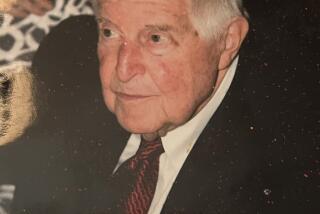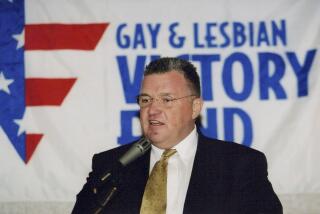Anne Wexler dies at 79; political power broker and influential Washington lobbyist
Anne Wexler, a well-connected political power broker who founded the first major Washington lobbying firm to be led by a woman and who was considered one of the capital’s most influential lobbyists, died Friday of cancer at her home in Washington. She was 79.
Wexler began her unlikely rise in Democratic Party circles as a Connecticut housewife who joined the PTA and a local zoning board. By 1978, she had carved out an important role in the Carter White House and used her skills at compromise and negotiation to win support on Capitol Hill for the administration’s agenda.
In 1981, she founded Wexler & Associates with two other Carter White House veterans, Gail L. Harrison and Robert Schule.
In a statement released Saturday, former President Carter called her an exemplary and “remarkably effective” public servant.
Through “her integrity” she brought “a good image” to lobbying, he said.
At first, Wexler was openly mocked by some of Washington’s male lobbyists. But when she landed the Motion Picture Assn. of America as a client, the laughing stopped. In short order, Wexler was doing business with General Motors and American Airlines.
In 1983, she brought former Republican operative and corporate lobbyist Nancy Clark Reynolds to Wexler & Associates to create one of Washington’s first avowedly bipartisan lobbying firms.
During the Clinton administration, Wexler was a key lobbyist and strategist for the passage of the North American Free Trade Agreement. Her work on behalf of the Australia-United States Free Trade Agreement in 2004 won her a top award from the Australian government.
She advised Comcast in merger negotiations with AT&T, and her wide-ranging list of clients also included the National Football League, Aetna Insurance, Kellogg, Bendix and Eastman Kodak.
Although she never sought public office, she remained a key player in Democratic politics. She served on the rules committees at Democratic national conventions in the 1960s and ‘70s and was Carter’s floor manager at the 1976 convention.
She was part of the Carter and Clinton transition teams and in 1984 helped prepare Geraldine Ferraro for her vice presidential debate with George H.W. Bush.
In 1970, when her future husband, Joseph D. Duffey, ran unsuccessfully for the U.S. Senate in Connecticut, Wexler recruited three bright young talents to work on his campaign: Bill Clinton, Hillary Rodham Clinton and John F. Kerry.
“I think she’s the most competent woman in Democratic politics in this country,” Carter political advisor Hamilton Jordan said in 1978. “She’s a tough, strong, straightforward, can-do kind of person.”
Anne Levy was born in New York on Feb. 10, 1930. She graduated from Skidmore College in Saratoga Springs, N.Y., married a doctor, settled in Westport, Conn., and raised two sons.
She joined the PTA and zoning board, began managing local campaigns and participated in Eugene McCarthy’s 1968 presidential run. After her divorce from Richard Wexler, she married Duffey in 1974 and moved to Washington.
She became associate publisher of Rolling Stone magazine, based in Washington, and was a deputy undersecretary of Commerce until April 1978, when she was asked to bring some Washington know-how to the Carter White House.
She was known throughout her career as a lobbyist for her willingness to work on both sides of the political aisle.
“Her feeling was, a democracy works not with endless fighting but through listening and compromising,” said Duffey, former president of American University and former chairman of the National Endowment for the Humanities.
Wexler had battled breast cancer since 1981, he said.
He survives her, as well as two sons from her first marriage, David Wexler of Gaithersburg, Md., and Daniel Wexler of Sanibel Island, Fla.; two stepsons, Michael Duffey of Bethesda, Md., and David Duffey of Venice, Fla.; a brother; and four grandchildren.
Martin Weil contributed to this report. Schudel and Weil write for the Washington Post.
More to Read
Start your day right
Sign up for Essential California for the L.A. Times biggest news, features and recommendations in your inbox six days a week.
You may occasionally receive promotional content from the Los Angeles Times.






